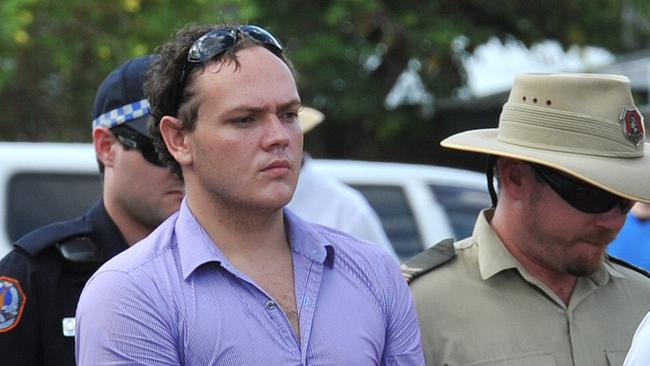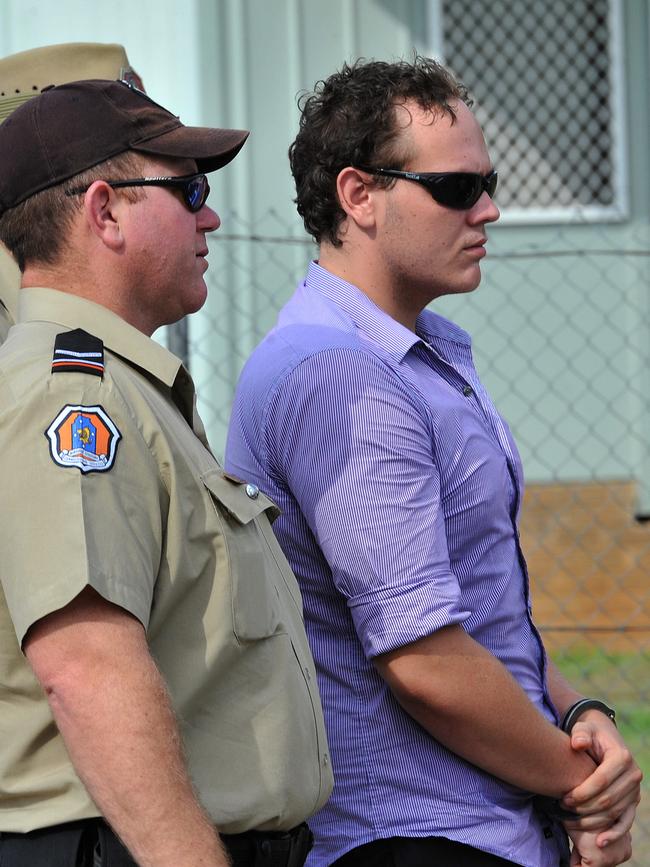Should Zak Grieve have been sentenced to life behind bars with at least 20 years to serve?
WHEN Zak Grieve fell quietly asleep in his bed on October 23, 2011, he sealed his own fate to serve at least 20 years in jail. His lawyers have now launched a last-ditch bid to set him free. CRAIG DUNLOP reports

Crime and Court
Don't miss out on the headlines from Crime and Court. Followed categories will be added to My News.
ON a warm Katherine night in October 2011, Zak Grieve curled up in bed and went to sleep. All he wanted to do was to “forget all about” the plan to murder his best mate’s step dad, Ray Niceforo.
As Grieve slept, his best mate Chris Malyschko and Darren “Spider” Halfpenny murdered Niceforo in cold blood, with Halfpenny holding him in a headlock as Malyschko bashed his skull in with a shifting spanner.
The events of that night set in motion what a revolving team of lawyers have seen as the exceptional “injustice” of Grieve being sentenced to life behind bars with at least 20 years to serve.
Grieve’s sprawling legal team, made up of everyone from student volunteers to London-based barrister Felicity Gerry QC, last month lodged a petition of mercy with the Northern Territory Administrator Vicki O’Halloran, asking her to use the rare powers she has to remit his sentence and release him unconditionally.
His fate now lies in the hands of Cabinet, who will advise Ms O’Halloran on whether she should make Grieve a free man.
■ ■ ■
GRIEVE’S legal team argue he is only behind bars because of a “perfect storm” of unfair laws and strange circumstances.
It’s an argument lawyers have been pushing ever since Grieve was sentenced.

On the steps of the Supreme Court in 2011, Grieve’s lawyer Jon Tippett QC said of the 20 year sentence: “That is the problem with mandatory sentencing, it is just screwed up”.
Not everyone sympathises with Grieve’s well-documented plight, including Niceforo’s friend Fran Casey, who told producers filming the documentary The Queen and Zak Grieve he would be “rolling in his grave” if he knew Grieve was trying to get out of jail.
Justice Dean Mildren found Grieve’s role in the killing of Niceforo was far from fleeting.
In sentencing Grieve in 2013, Justice Mildren found he was paid at least $2500 in blood money to take part in the murder of Niceforo, during which he was to be armed with a steel pole.
Whether Grieve pulled out of the murder or not, Justice Mildren said in 2013, “does not really matter” because he subsequently did “nothing at all” to stop his two mates, so under Territory law was guilty of murder in any case.
Grieve had told the jury: “I didn’t (call the police), I just did not call anyone, I just wanted to go home and go to sleep and forget all about it”.
He also told the jury Malyschko had first approached him about his plan to kill Niceforo
“Chris came up to me and asked me to help get rid of someone,” Grieve said.
“He wanted a third person.
“I thought of someone who was a bit of a tough guy and I asked my friend Darren Halfpenny.”
The three first discussed their plan to kill Niceforo in the laundromat owned by Malyschko’s mother, Bronwyn Buttery.
Buttery would put up the $15,000 to kill Niceforo, who she told police had turned her life into a “living hell”, and a jury would find her guilty of manslaughter.
In the laundromat, Malyschko produced a map of Niceforo’s house.
“We were shown a map of the house and the way we were going to do it,” Grieve said.
Grieve said there was “no reason” he deleted text messages from his phone about what his involvement was to be.

One of those messages shows Grieve, on the weekend before Niceforo’s eventual murder, saying the three should put their plans off for a few days.
With his own lawyer asking the questions, Grieve said his conscience was playing on him.
“I knew I couldn’t go through with it so I needed time to tell my best friend that I couldn’t go through with it,” he said.
But prosecutor Lesley Taylor QC, renowned for being “fierce but fair”, had a different theory, which Grieve denied. That he wanted the killing delayed because he had shifts that weekend delivering pizza for Eagle Boys.
“Why wasn’t that the moment to say, ‘look, I just don't want to wait a few nights, I can’t do this?’,” asked Ms Taylor, who is now a Victorian Supreme Court judge.
The answer Grieve gave was the same as his answer for tough questions that afternoon in the witness box: “Because Chris was my best friend.”.
■ ■ ■
THE night Niceforo was eventually murdered, Grieve, Malyschko and Halfpenny sat around playing video games and smoking pot until their soon-to-be victim arrived home at his flat about 30 metres away.
Except for the fact a man was about to die, it was an entirely normal night for Grieve, who spent “essentially every night … playing video games and getting stoned”.
Malyschko spotted Niceforo arriving home some time around 11pm that night, gave his two sidekicks the signal and said, “he’s home”.
It was out by Malyschko’s van where Grieve pulled the pin on his physical involvement in the killing.
Malyshko was loading the van up with the weapons the three young men were to use when Grieve told him he was pulling out.
Grieve later told the Supreme Court: “I knew I couldn’t avoid it anymore and I had to tell Chris that I couldn’t do it.”
“I said to him I can’t go through with this I cannot help you.
“Chris was a little annoyed and he just said, ‘come on man’.”
Inside, Grieve sat in silence as Halfpenny called him a “pussy” for pulling out, while Malyschko rolled a cigarette before dropping his mate home.
Perhaps the moment Grieve’s fate was sealed at his trial was when, under cross-examination, Ms Taylor started asking him why he didn’t to anything differently.
“You didn’t say ‘Chris, are you nuts? This has gone too far we can’t do this’, or anything like that?” Mr Taylor asked.
“No.”
“Were you prepared to let your best friend go and kill a man were you?
“It was his choice.”
“You didn’t try to stop him, you didn’t try to discourage him?
“No.”
“You didn’t say, ‘go to the police Chris, there are other ways to deal with Ray’?”
“No. I just wanted to go home.”
“And you didn’t care what happened to your best friend?”
“I just wanted to go home.”
As the questions continued, it became clear just how easily Grieve could have saved Niceforo’s life and kept himself and his best mate out of jail.
“You didn’t say to Mr Halfpenny, ‘look, I got you in to this, the joke’s gone to far, we can’t do this, this really can’t happen, it’s time to bail’, did you try and stop Mr Halfpenny like that?” Ms Taylor asked.
“No,” Grieve said.
“Not at all?”
“No.”
“You didn’t care at that point whether Mr Malyshko and Mr Halfpenny carried on with the plan, did you?”
“No.”
“No?”
“No.”
Asked why he didn’t call police to stop Niceforo’s murder, Grieve said: “I could have, but I didn’t.”
The next morning, with Niceforo dead and Malyschko and Halfpenny rushing around trying to cover up the crime, Grieve woke from his slumber and went to work.
■ ■ ■
JUSTICE Mildren famously told Grieve the mandatory life sentence with a 20 year minimum non-parole period was “unprincipled and morally insensible”.
Grieve’s lawyers have seized on those words in their bid to have their now-25-year-old client set free, but have also argued that Justice Mildren got it wrong when he said the Administrator should release Grieve after 12 years served.
Grieve has now spent less than seven years behind bars, where his legal team say he is a model prisoner, getting what he describes as “just about every qualification you can get” in jail.
“He is an intelligent, artistic and sensitive young man who has made the best of his time in custody,” Grieve’s legal team say in their plea for mercy, a 34-page document which will play a central role in his fate.
The team argues a fair sentence would have seen him serve less than the nearly seven years he has already served
Grieve’s legal team argue the rarely-used prerogative of mercy is “rightly reserved for cases of exactly this nature” where there has been a “grave injustice that amounts to nothing less than a systemic failure and a taint on the broader criminal justice system”.
■ ■ ■
GRIEVE’S lawyers gloss over the repeated steps successive governments have made to ensure murderers in the Territory serve at least 20 years behind bars, which it is not alone in.
The last time the Territory parliament discussed murder sentences was in 2008 when the then-Labor government closed a loophole in previous sentencing laws.
Labor Attorney-General Chris Burns told parliament the community expected murderers to be punished harshly for their crimes.
“A lengthy sentence of imprisonment must be imposed and the community expects this class of prisoner to serve that sentence,” he said at the time.
The bill was rushed through on urgency with the support of the CLP, whose leader Jodeen Carney said her reaction when the loophole became apparent was “Whoops! A couple of mistakes have been made”.
It was considered a given then that murderers should be jailed for life, and forced to serve at least 20 years.
There are at least some reasons why the Territory’s law makers could justify taking a harsh stance on murder sentences. The Territory has homicide rates around six times higher than the national average.
But the argument that this grim statistic justifies a tough stance on sentencing cuts both ways, since that stance — which has been in place for decades — has apparently done little, if anything, to stop a would-be killer in his tracks and think twice about what he was about to do.
While most judges and many lawyers have criticised mandatory sentencing at some point, perhaps the most vocal critic has been former Criminal Lawyers Association president Russell Goldflam, who has repeatedly described it as a “rotten albatross”.
In one of his first missives against mandatory sentencing in 1999, he wrote of the apparent unfairness of a then 19-year-old petrol sniffer being jailed for 25 years for the rape and strangling murder of a toddler at Hermannsburg.
“As I went on to say in that article,” he wrote in another missive in 2016, “there was no public outcry about any of this, because no-one cries out for murderers.”.
■ ■ ■
GRIEVE’S fate now rests in the hands of Cabinet, where it will be debated in secrecy in coming months.
At least part of what Grieve’s legal team is banking on is whether the current Labor Government might have a firm position against mandatory sentencing, and whether they might let Grieve out of jail as a symbol of the injustices its critics say it results in.
Since coming to power in 2016, the Government has been increasingly vague, having commissioned a review of mandatory sentencing laws but not having taken any action on them.
But, for now at least, Grieve remains behind bars, where he spends most of his days studying and painting.


